新标准大学英语4 B4U4教案
- 格式:doc
- 大小:102.00 KB
- 文档页数:7
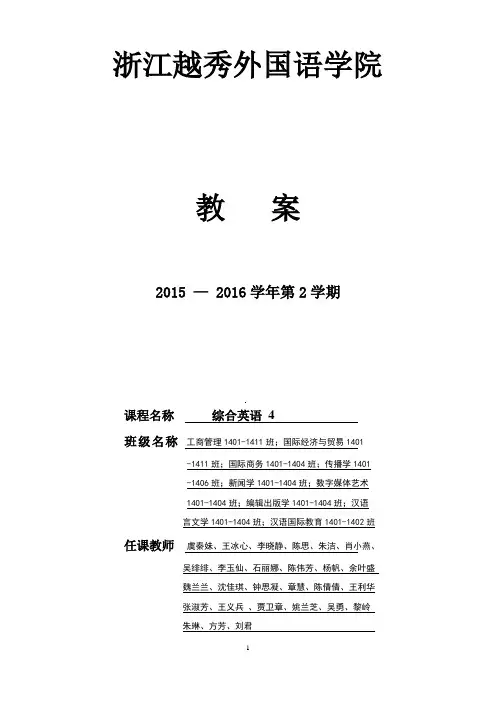
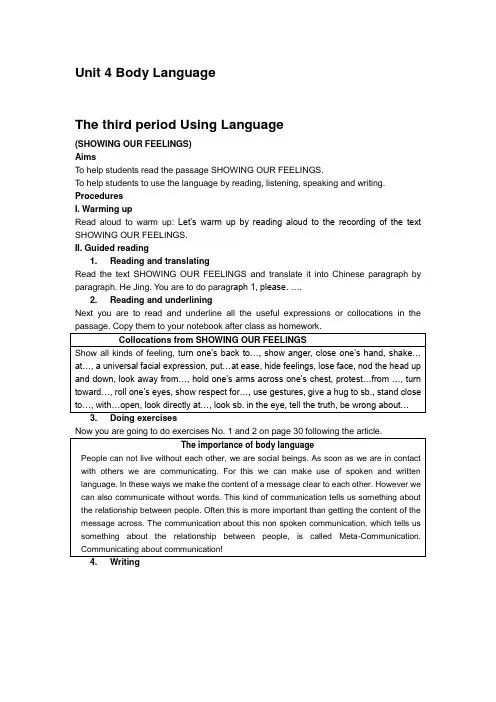
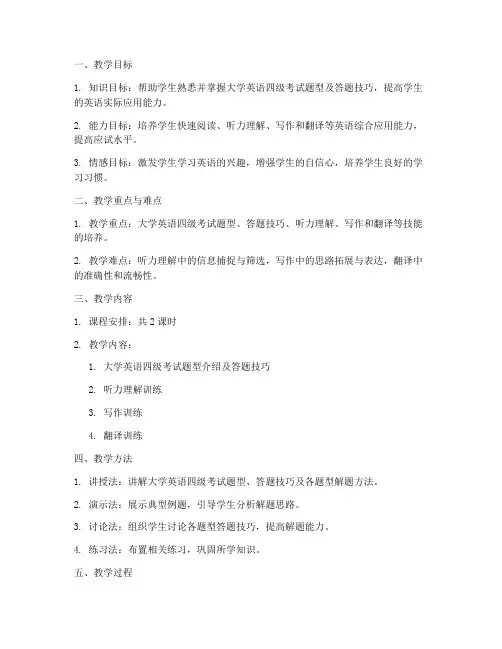
一、教学目标1. 知识目标:帮助学生熟悉并掌握大学英语四级考试题型及答题技巧,提高学生的英语实际应用能力。
2. 能力目标:培养学生快速阅读、听力理解、写作和翻译等英语综合应用能力,提高应试水平。
3. 情感目标:激发学生学习英语的兴趣,增强学生的自信心,培养学生良好的学习习惯。
二、教学重点与难点1. 教学重点:大学英语四级考试题型、答题技巧、听力理解、写作和翻译等技能的培养。
2. 教学难点:听力理解中的信息捕捉与筛选,写作中的思路拓展与表达,翻译中的准确性和流畅性。
三、教学内容1. 课程安排:共2课时2. 教学内容:1. 大学英语四级考试题型介绍及答题技巧2. 听力理解训练3. 写作训练4. 翻译训练四、教学方法1. 讲授法:讲解大学英语四级考试题型、答题技巧及各题型解题方法。
2. 演示法:展示典型例题,引导学生分析解题思路。
3. 讨论法:组织学生讨论各题型答题技巧,提高解题能力。
4. 练习法:布置相关练习,巩固所学知识。
五、教学过程1. 导入新课(5分钟)- 介绍大学英语四级考试的重要性及备考方法。
- 概述本节课的教学内容。
2. 讲解大学英语四级考试题型及答题技巧(15分钟)- 阅读理解:讲解各种题型特点及解题技巧。
- 听力理解:讲解听力技巧,如预读、捕捉关键词等。
- 写作:讲解写作思路及表达方式。
- 翻译:讲解翻译技巧,如直译、意译等。
3. 听力理解训练(15分钟)- 播放一段听力材料,引导学生进行听力练习。
- 分析听力材料,讲解解题思路。
4. 写作训练(15分钟)- 布置一篇写作题目,要求学生在规定时间内完成。
- 讲解写作过程中的注意事项,如段落划分、句子结构等。
5. 翻译训练(15分钟)- 布置一段翻译材料,要求学生进行翻译练习。
- 讲解翻译过程中的技巧,如直译、意译等。
6. 总结与反馈(5分钟)- 对本节课所学内容进行总结。
- 收集学生对教学内容的反馈,调整教学策略。
六、教学评价1. 课堂参与度:观察学生在课堂上的表现,如提问、回答问题等。
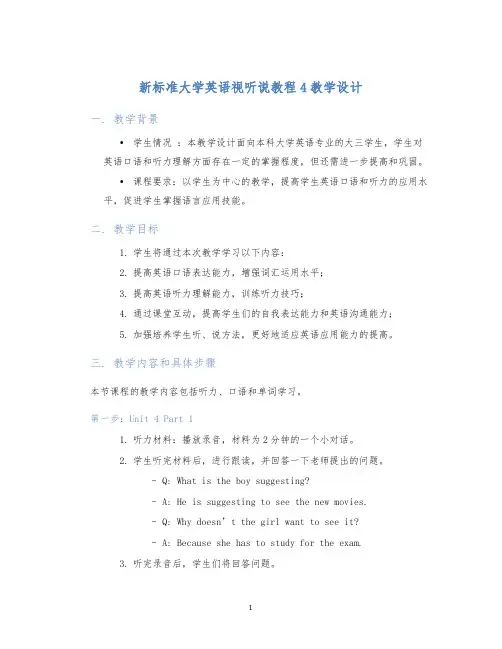
新标准大学英语视听说教程4教学设计一. 教学背景•学生情况:本教学设计面向本科大学英语专业的大三学生,学生对英语口语和听力理解方面存在一定的掌握程度,但还需进一步提高和巩固。
•课程要求:以学生为中心的教学,提高学生英语口语和听力的应用水平,促进学生掌握语言应用技能。
二. 教学目标1.学生将通过本次教学学习以下内容:2.提高英语口语表达能力,增强词汇运用水平;3.提高英语听力理解能力,训练听力技巧;4.通过课堂互动,提高学生们的自我表达能力和英语沟通能力;5.加强培养学生听、说方法,更好地适应英语应用能力的提高。
三. 教学内容和具体步骤本节课程的教学内容包括听力、口语和单词学习。
第一步:Unit 4 Part 11.听力材料:播放录音,材料为2分钟的一个小对话。
2.学生听完材料后,进行跟读,并回答一下老师提出的问题。
–Q: What is the boy suggesting?–A: He is suggesting to see the new movies.–Q: Why doesn’t the girl want to see it?–A: Because she has to study for the exam.3.听完录音后,学生们将回答问题。
第二步:Unit 4 Part 21.听力材料:播放录音,材料为一篇3分钟左右的新闻。
2.学生跟读并回答问题。
–Q: What is the news talking about?–A: It is about the rising crime rate in the city.–Q: What is the solution proposed by the police?–A: The police have increased their presence on the streets and are working to build stronger relationships withlocal communities.3.学生将完成问题的回答。
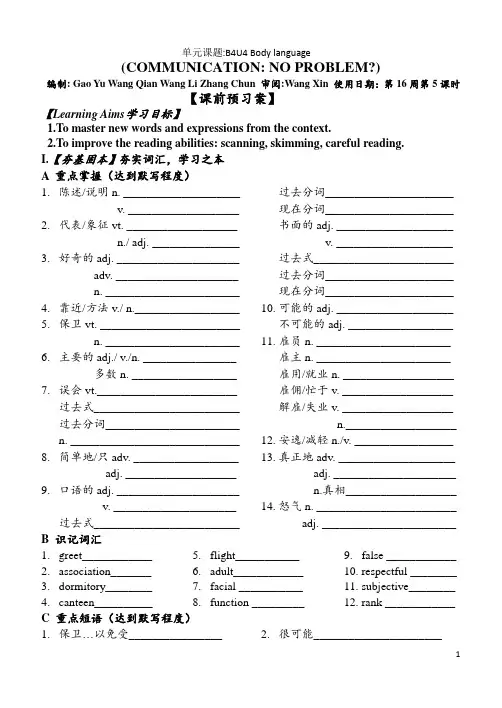
单元课题:B4U4 Body language(COMMUNICATION: NO PROBLEM?)编制: Gao Yu Wang Qian Wang Li Zhang Chun 审阅:Wang Xin 使用日期:第16周第5课时【课前预习案】【Learning Aims学习目标】1.To master new words and expressions from the context.2.To improve the reading abilities: scanning, skimming, careful reading.I.【夯基固本】夯实词汇,学习之本A 重点掌握(达到默写程度)1.陈述/说明n. ____________________v. ___________________ 2.代表/象征vt. ___________________n./ adj. _______________ 3.好奇的adj. _____________________adv. _____________________n. _______________________4.靠近/方法v./ n.__________________5.保卫vt. ________________________n. _______________________ 6.主要的adj./ v./n. ________________多数n. __________________ 7.误会vt.________________________过去式_________________________ 过去分词_______________________ n. _____________________________ 8.简单地/只adv. __________________adj. ___________________ 9.口语的adj. _____________________v. _____________________ 过去式_________________________过去分词______________________现在分词______________________书面的adj. ____________________v. ____________________ 过去式________________________过去分词______________________现在分词______________________ 10.可能的adj. ____________________不可能的adj. __________________ 11.雇员n. _______________________雇主n. _______________________雇用/就业n. ___________________雇佣/忙于v. ___________________解雇/失业v. ___________________n.___________________12.安逸/减轻n./v. _________________13.真正地adv. ____________________adj. _____________________n.真相___________________ 14.怒气n. ________________________adj. _______________________B 识记词汇1.greet____________2.association_______3.dormitory________4.canteen__________5.flight___________6.adult____________7.facial ___________8.function _________9.false ____________10.respectful ________11.subjective________12.rank ____________C 重点短语(达到默写程度)1.保卫…以免受________________2.很可能______________________3.总的来说____________________4.舒适________________5.丢脸________________6.背对________________D 短语汇总(方法指导:在课本P17-18用荧光笔标出,课前达到默写程度)1.look around 四周看2.introduce sb to sb 把…介绍给3.put up举起张贴4.reach one’s hand out to向…伸出手5.shake hands 握手6.on the contrary正相反;恰好相反Ⅱ【自主预习静心悦读】方法指导:快速阅读文章P26, 写出最佳答案。
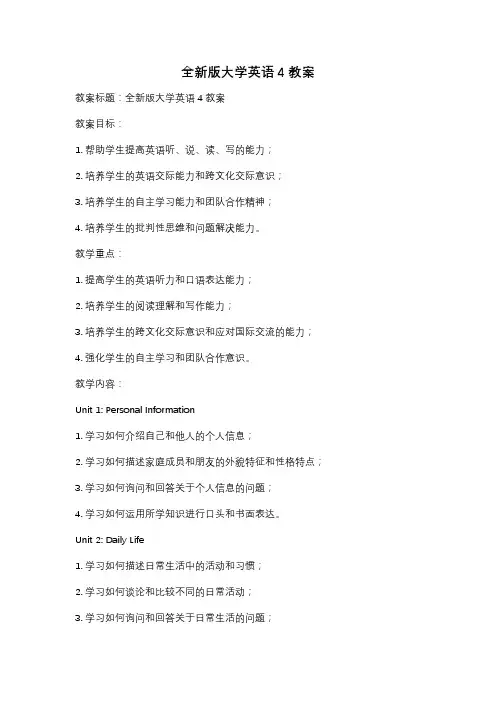
全新版大学英语4教案教案标题:全新版大学英语4教案教案目标:1. 帮助学生提高英语听、说、读、写的能力;2. 培养学生的英语交际能力和跨文化交际意识;3. 培养学生的自主学习能力和团队合作精神;4. 培养学生的批判性思维和问题解决能力。
教学重点:1. 提高学生的英语听力和口语表达能力;2. 培养学生的阅读理解和写作能力;3. 培养学生的跨文化交际意识和应对国际交流的能力;4. 强化学生的自主学习和团队合作意识。
教学内容:Unit 1: Personal Information1. 学习如何介绍自己和他人的个人信息;2. 学习如何描述家庭成员和朋友的外貌特征和性格特点;3. 学习如何询问和回答关于个人信息的问题;4. 学习如何运用所学知识进行口头和书面表达。
Unit 2: Daily Life1. 学习如何描述日常生活中的活动和习惯;2. 学习如何谈论和比较不同的日常活动;3. 学习如何询问和回答关于日常生活的问题;4. 学习如何运用所学知识进行口头和书面表达。
Unit 3: Leisure and Entertainment1. 学习如何谈论和描述不同的休闲活动和娱乐方式;2. 学习如何谈论和比较不同的电影、音乐和体育项目;3. 学习如何询问和回答关于休闲和娱乐的问题;4. 学习如何运用所学知识进行口头和书面表达。
教学方法:1. 情景教学法:通过创设真实的语言情境,帮助学生理解和运用所学知识;2. 合作学习法:通过小组合作活动,培养学生的团队合作精神和互助学习能力;3. 任务型教学法:通过给学生真实的任务,激发学生的学习兴趣和动力;4. 多媒体教学法:利用多媒体技术辅助教学,提高学生的学习效果和兴趣。
教学步骤:1. 导入:通过引入相关话题或图片,激发学生的学习兴趣;2. 情景呈现:通过展示相关情景或对话,帮助学生理解语言的应用场景;3. 语言输入:通过教师示范和多媒体展示,向学生介绍新的语言知识和表达方式;4. 练习活动:通过个人、小组或全班活动,让学生进行口头或书面练习;5. 拓展延伸:通过拓展活动或课外阅读,帮助学生进一步巩固所学知识;6. 总结归纳:通过师生互动或小组讨论,总结本节课的重点和难点;7. 作业布置:布置相关练习或任务,让学生在课后进行自主学习。
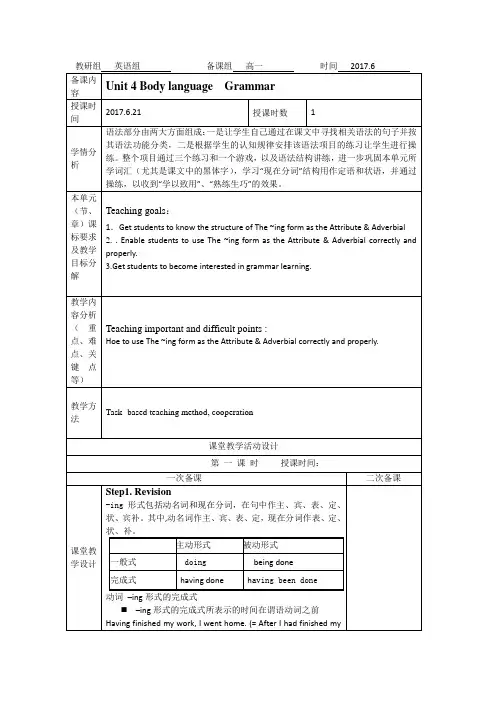
教研组英语组备课组高一时间2017.6 备课内容Unit 4 Body language Grammar授课时间2017.6.21 授课时数 1学情分析语法部分由两大方面组成:一是让学生自己通过在课文中寻找相关语法的句子并按其语法功能分类,二是根据学生的认知规律安排该语法项目的练习让学生进行操练。
整个项目通过三个练习和一个游戏,以及语法结构讲练,进一步巩固本单元所学词汇(尤其是课文中的黑体字),学习“现在分词”结构用作定语和状语,并通过操练,以收到“学以致用”、“熟练生巧”的效果。
本单元(节、章)课标要求及教学目标分解Teaching goals:1.Get students to know the structure of The ~ing form as the Attribute & Adverbial 2. . Enable students to use The ~ing form as the Attribute & Adverbial correctly and properly.3.Get students to become interested in grammar learning.教学内容分析(重点、难点、关键点等)Teaching important and difficult points :Hoe to use The ~ing form as the Attribute & Adverbial correctly and properly.教学方法Task- based teaching method, cooperation课堂教学活动设计第一课时授课时间:一次备课二次备课课堂教学设计Step1. Revision-ing 形式包括动名词和现在分词,在句中作主、宾、表、定、状、宾补。
其中,动名词作主、宾、表、定,现在分词作表、定、状、补。
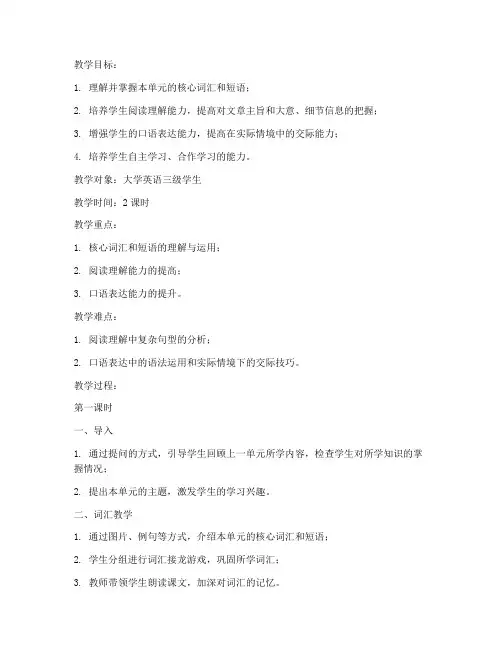
教学目标:1. 理解并掌握本单元的核心词汇和短语;2. 培养学生阅读理解能力,提高对文章主旨和大意、细节信息的把握;3. 增强学生的口语表达能力,提高在实际情境中的交际能力;4. 培养学生自主学习、合作学习的能力。
教学对象:大学英语三级学生教学时间:2课时教学重点:1. 核心词汇和短语的理解与运用;2. 阅读理解能力的提高;3. 口语表达能力的提升。
教学难点:1. 阅读理解中复杂句型的分析;2. 口语表达中的语法运用和实际情境下的交际技巧。
教学过程:第一课时一、导入1. 通过提问的方式,引导学生回顾上一单元所学内容,检查学生对所学知识的掌握情况;2. 提出本单元的主题,激发学生的学习兴趣。
二、词汇教学1. 通过图片、例句等方式,介绍本单元的核心词汇和短语;2. 学生分组进行词汇接龙游戏,巩固所学词汇;3. 教师带领学生朗读课文,加深对词汇的记忆。
三、阅读理解1. 学生自主阅读课文,完成课后练习;2. 教师讲解阅读理解中的重点和难点,引导学生分析文章结构、主旨和大意;3. 学生分组讨论,分享阅读心得。
四、口语表达1. 教师引导学生进行角色扮演,模拟实际交际场景;2. 学生分组进行口语练习,提高口语表达能力;3. 教师点评学生的口语表达,提出改进意见。
第二课时一、复习1. 复习上一节课所学内容,检查学生对知识的掌握情况;2. 学生展示本节课所学词汇和短语,巩固记忆。
二、阅读理解1. 学生自主阅读课文,完成课后练习;2. 教师讲解阅读理解中的重点和难点,引导学生分析文章结构、主旨和大意;3. 学生分组讨论,分享阅读心得。
三、口语表达1. 教师引导学生进行角色扮演,模拟实际交际场景;2. 学生分组进行口语练习,提高口语表达能力;3. 教师点评学生的口语表达,提出改进意见。
四、总结与作业布置1. 教师对本节课所学内容进行总结,强调重点和难点;2. 布置课后作业,巩固所学知识。
教学反思:本节课通过词汇、阅读理解和口语表达等多个方面的教学,帮助学生掌握大学英语Unit 4 的核心知识。
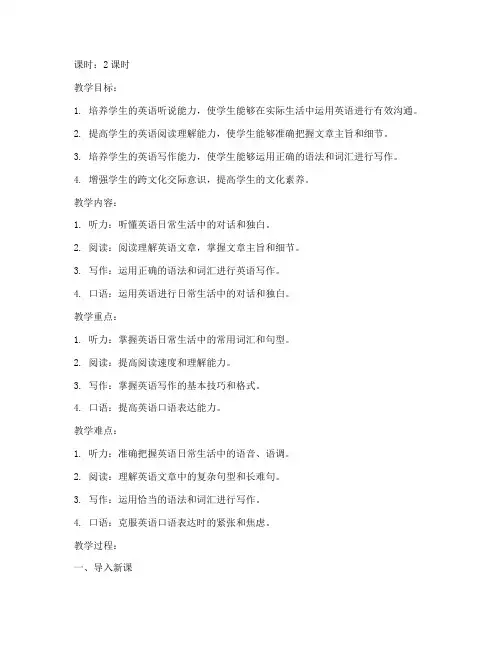
课时:2课时教学目标:1. 培养学生的英语听说能力,使学生能够在实际生活中运用英语进行有效沟通。
2. 提高学生的英语阅读理解能力,使学生能够准确把握文章主旨和细节。
3. 培养学生的英语写作能力,使学生能够运用正确的语法和词汇进行写作。
4. 增强学生的跨文化交际意识,提高学生的文化素养。
教学内容:1. 听力:听懂英语日常生活中的对话和独白。
2. 阅读:阅读理解英语文章,掌握文章主旨和细节。
3. 写作:运用正确的语法和词汇进行英语写作。
4. 口语:运用英语进行日常生活中的对话和独白。
教学重点:1. 听力:掌握英语日常生活中的常用词汇和句型。
2. 阅读:提高阅读速度和理解能力。
3. 写作:掌握英语写作的基本技巧和格式。
4. 口语:提高英语口语表达能力。
教学难点:1. 听力:准确把握英语日常生活中的语音、语调。
2. 阅读:理解英语文章中的复杂句型和长难句。
3. 写作:运用恰当的语法和词汇进行写作。
4. 口语:克服英语口语表达时的紧张和焦虑。
教学过程:一、导入新课1. 通过播放一段英语日常生活中的对话或独白,激发学生的学习兴趣。
2. 提问学生:What do you hear? What do you think about this dialogue?二、听力教学1. 学生听录音,跟读对话或独白。
2. 教师讲解录音中的重点词汇和句型。
3. 学生进行听力练习,巩固所学内容。
三、阅读教学1. 学生阅读英语文章,了解文章主旨和细节。
2. 教师讲解文章中的复杂句型和长难句。
3. 学生进行阅读练习,提高阅读速度和理解能力。
四、写作教学1. 学生根据所学内容,运用正确的语法和词汇进行写作。
2. 教师讲解写作的基本技巧和格式。
3. 学生进行写作练习,提高写作能力。
五、口语教学1. 学生运用英语进行日常生活中的对话和独白。
2. 教师讲解口语表达时的技巧和注意事项。
3. 学生进行口语练习,提高口语表达能力。
六、归纳小结1. 教师总结本节课所学内容,强调重点和难点。
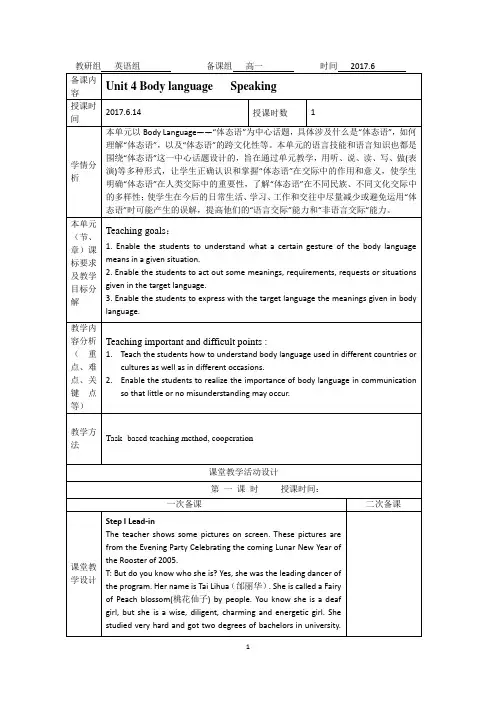
教研组英语组备课组高一时间2017.6 备课内容Unit 4 Body language Speaking授课时间2017.6.14 授课时数 1学情分析本单元以Body Language——“体态语”为中心话题,具体涉及什么是“体态语”,如何理解“体态语”,以及“体态语”的跨文化性等。
本单元的语言技能和语言知识也都是围绕“体态语”这一中心话题设计的,旨在通过单元教学,用听、说、读、写、做(表演)等多种形式,让学生正确认识和掌握“体态语”在交际中的作用和意义,使学生明确“体态语”在人类交际中的重要性,了解“体态语”在不同民族、不同文化交际中的多样性;使学生在今后的日常生活、学习、工作和交往中尽量减少或避免运用“体态语”时可能产生的误解,提高他们的“语言交际”能力和“非语言交际”能力。
本单元(节、章)课标要求及教学目标分解Teaching goals:1. Enable the students to understand what a certain gesture of the body language means in a given situation.2. Enable the students to act out some meanings, requirements, requests or situations given in the target language.3. Enable the students to express with the target language the meanings given in body language.教学内容分析(重点、难点、关键点等)Teaching important and difficult points :1.Teach the students how to understand body language used in different countries orcultures as well as in different occasions.2.Enable the students to realize the importance of body language in communicationso that little or no misunderstanding may occur.教学方法Task- based teaching method, cooperation课堂教学活动设计第一课时授课时间:一次备课二次备课课堂教学设计Step I Lead-inThe teacher shows some pictures on screen. These pictures are from the Evening Party Celebrating the coming Lunar New Year of the Rooster of 2005.T: But do you know who she is? Yes, she was the leading dancer of the program. Her name is Tai Lihua(邰丽华). She is called a Fairy of Peach blossom(桃花仙子) by people. You know she is a deaf girl, but she is a wise, diligent, charming and energetic girl. She studied very hard and got two degrees of bachelors in university.She was famous as an artist for her wonderful performance. She is deaf and dumb. But how did she get that great achievement and became a successful person? She loves life very much. We should learn from her spirit. Besides her hard working, body language plays a very important part in her life. We are all healthy people, sometimes we can use body language to express ourselves. So we should pay more attention to learning body languages.Step II IntroductionT: Now let’s do some TPR (Total Physical Response) activities together, I hope you will enjoy them and have fun as well. Touch your head / face / eyes / nose / mouth / ears / cheeks / forehead / shoulders / stomach / legs / feet / toes ...Shake your head / arm / hand ...Wave your arm / hand ...Open your eyes / arms /mouth ...Close your eyes / mouth ...Twist your wrist / waist.Cross your arms / fingers.Nod your head. Bow your head.Make a face to each other.Bend / cry / shout / scream / smile / laugh ...T: All right. Now let’s do them a little bit difficult. Let’s play a game together. Those who fail to follow the rule of the game will be dropped out. The game is: “Simon says”. For example, if I say “Simon says, touch your head”, then you touch your head. If not, you shouldn’t touch your head but remain still. Clear? Ready? No w let’s start.3 or 5 minutes for the game.T: Ok. It’s time to take up the lesson. Please look at the screen. Let’s take a look at the following gestures:T: What are the actions of the above gestures? What do they mean?S4: The first gesture is a handshake, which means “You’re welcome”.S5: The second is a handclap, which means “Come on” or “Be cheerful” or something like that.S6: The third one is a V-shaped posture of the first finger and the middle finger, which suggests a wish for the other or others to succeed.S7: The fourth is a half-closed hand with the thumb down. It means the one who gives this gesture is against the other’s idea or simply refuses the request.S8: The fifth is a worried look of a woman. She wrinkles her brows or frowns. It also seems that she scowls. It shows that she isworried or sad. In other words, she is unhappy.S9: The sixth is a man shedding tears. Tears were running down his cheeks. He is very sad for losing his relatives or sad for his failure.S10: The seventh is a smiling face. It is easy to see that she is very happy.S11: The eighth is a gesture of waving hands. They are waving goodbye to people who are around to see them off.S12: The ninth is a hand stretched out forward with great strength. The boy is trying to stop a tank from entering into his homeland.S13: The tenth is hands stretched out upward. They are all very cheerful. They are wild with joy; maybe they have just won a game. So we can see that they are cheering for their victory.T: You have all done a good job. So you see that there are many cases or situations in which body language can convey meanings as well as spoken or written languages. If you want to know more about it, let’s come to Unit 4 Body Language.Step Ⅲ PracticeT: Look at Page 25.What are these people communicating?Step Ⅳ Time for FunT: Now let’s play a game in groups of four. One thinks of a situation and asks the others to show some actions using body language. When the one chooses the action that is most likely, it is his or her turn to think of some other situation for the others to show the actions so that the game may go on for a few rounds. Clear?Ss: Yes. That’s funny!T: Try to make the situations as interesting and enjoyable as you can. And show the situation as lively as possible. Besides, make sure that everyone has a turn.Ss: All right.S1: What are you likely to do if it rains?(Actions) S2: reads a book;S3: puts on a raincoat;S4: cleans the house.S1: Ok. I think S3 seems the most likely, so it is his turn.Step V Role Play (Speaking task on P67)T: Now, there’s still a little time left. Let’s come to Speaking Task on Page 67.Step VI Homework1. Team work: Discuss the importance of body language.2. Go over the Reading:板书提纲课后反思签阅备课组长教研组长教务主任教研组英语组备课组高一时间2017.6 备课内容Unit 4 Body language warming up & Reading (I)授课时间2017.6.15 授课时数 1学情分析并通过WARMING UP的活动,让学生了解有声语言与“体态语”的对应关系,了解语言意义与行为意义(“体态语”)在交际中具有同等重要的作用。
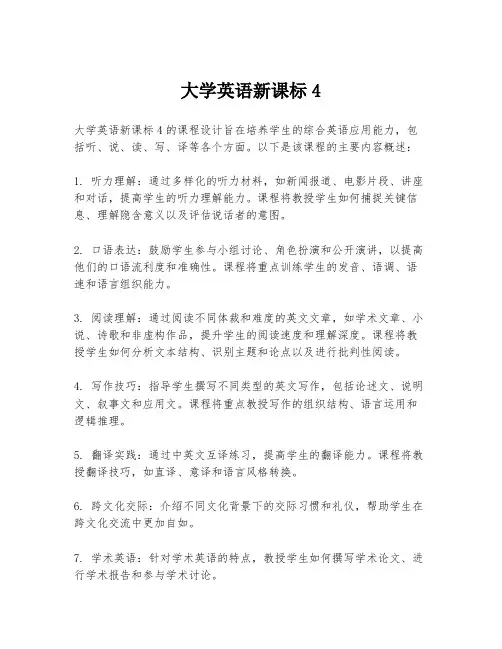
大学英语新课标4大学英语新课标4的课程设计旨在培养学生的综合英语应用能力,包括听、说、读、写、译等各个方面。
以下是该课程的主要内容概述:1. 听力理解:通过多样化的听力材料,如新闻报道、电影片段、讲座和对话,提高学生的听力理解能力。
课程将教授学生如何捕捉关键信息、理解隐含意义以及评估说话者的意图。
2. 口语表达:鼓励学生参与小组讨论、角色扮演和公开演讲,以提高他们的口语流利度和准确性。
课程将重点训练学生的发音、语调、语速和语言组织能力。
3. 阅读理解:通过阅读不同体裁和难度的英文文章,如学术文章、小说、诗歌和非虚构作品,提升学生的阅读速度和理解深度。
课程将教授学生如何分析文本结构、识别主题和论点以及进行批判性阅读。
4. 写作技巧:指导学生撰写不同类型的英文写作,包括论述文、说明文、叙事文和应用文。
课程将重点教授写作的组织结构、语言运用和逻辑推理。
5. 翻译实践:通过中英文互译练习,提高学生的翻译能力。
课程将教授翻译技巧,如直译、意译和语言风格转换。
6. 跨文化交际:介绍不同文化背景下的交际习惯和礼仪,帮助学生在跨文化交流中更加自如。
7. 学术英语:针对学术英语的特点,教授学生如何撰写学术论文、进行学术报告和参与学术讨论。
8. 技术辅助学习:利用多媒体和网络资源,如在线课程、语言学习软件和学术数据库,提高学习效率。
9. 自主学习能力:鼓励学生制定个人学习计划,培养独立解决问题的能力。
10. 评估与反馈:通过定期的测试和评估,及时给予学生反馈,帮助他们了解自己的进步和需要改进的地方。
大学英语新课标4的课程设计注重实用性和互动性,旨在帮助学生在全球化背景下更好地运用英语进行沟通和学术交流。
教研组英语组备课组高一时间2017.6 备课内容Unit 4 Body language using language授课时间2017.6.22 授课时数 1学情分析USING LANGUAGE 通过增加阅读篇目“Showing Our Feelings”来拓展学生在“体态语”方面的知识视野,并通过“True” or “False”判断练习和问题讨论,使学生进一步明确“体态语”对人们在日常交际中了解对方情感、思想、态度等方面所起的作用。
本单元(节、章)课标要求及教学目标分解Teaching goals:1.Enable the students to know more about body language.2.How we can “show our feelings” with the body language learned in this unit orgained in our social life.3.Enable the students to understand better body language.教学内容分析(重点、难点、关键点等)Teaching important and difficult points :1.How body language shows the same or different feelings among people fromdifferent cultures.2.How to tell that the same body language shows different feelings in differentcultures.教学方法Task- based teaching method, cooperation课堂教学活动设计第一课时授课时间:一次备课二次备课课堂教学设计Step I Pre-reading1. What is the function of body language?2. How do you find body language in our daily life?3. How can the same body language express different feelings or ideas in different cultures?4. How can different body language express the same feeling or idea in different culturesStep II Fast readingTURE OF FALSE1. Body language is never as powerful as spoken language.2. If you are angry at a person, you might turn your back to him or her.3. You can threaten a person by refusing to speak.4. You should not greet your new boss by giving her or him a hug.5. Body language is the same all over the world.6. Most people can understand each other if they try.Then ask the students to do it one by one and ask them to explain why some of the statements are wrong.Step III Further readingT: We have just read a passage entitled “Showing Our Feelings”, which tells us more about body language. Now let’s read another passage in the Workbook on P66. The title of the reading text is: The Open Hand - A Universal Sign. You will be given 3 minutes to read through the text as quickly as you can, trying to get as much information from the text as possible.Ss: Yes, Sir.T: What information have you got?S1: More about body language, sir. We have learned how people are communicating or getting along with each other besides using spoken language. We are also asked to think about some new situations in which we will communicate in body language.S2: And we have to think about the following questions: It is known that a smile is a sign that people feel friendly and happy. But we have to consider: 1. What if we don’t know who the new person is? 2. What if we are not introduced by a friend? 3. What if we are meeting a stranger in an unfamiliar place?S3: And the most important of all is that we have to makesure whether we can trust people we do not know, and we have to show that we are not dangerous.S4: Quite true. We have different ways to show our hands —our open hands, which means that we are not armed and we are friendly.S5: In many cultures today, the Western custom of the handshake is used. Besides this, traditionally, Chinese greet others by covering the left hand with the right hand and bowing; the Japanese cover on hand with the other and bow slightly or quite low, depending on whom they greeted; Hindu people join their hands in front of their faces and bow their heads; Muslims will touch their heart, mouth and forehead to show respect.S6: Now young people in the West give each other the “high five”when they clap each other’s hands in the air.S7: You have taken the words out of my mouth. And I believe that in almost all cultures, to smile and show an open right hand is themost common way to show the goodwill greeting.T: I am more than happy to hear you can get so much informationfrom the passage when you do the reading! Now let’s act outsome of the gestures in the reading material, OK?Some students are asked to act out the body language whichappears in the reading text is: The Open Hand - A Universal Sign,such as a handshake, the traditional greetings in China, theJapanese way to greet people, the ways Hindu people andMuslims use to greet people, and the way young people in theWest use now.Several minutes later.T: Before we come to the end of this period, let’s take up the lastitem, doing the arrangement of the information under thepassage on Page 67.S8: It can be dangerous to meet people you do not know.S9: Many Asian people do not usually physically touch strangers.S10: If we show an open hand, it means that we are not holdinganything dangerous.S11: The right hand is usually used because it is almost thestronger.S12: People shake their hands when meeting to show that theycan be trusted.S13: To show respect, people will touch their heart and mouthwhen greeting someone.Step IV Homework1. Read aloud all the reading texts in this unit.2. Get ready to retell the two reading passages learnt in thisperiod.板书提纲课后反思备课组长教研组长教务主任签阅。
一、课题《全新版大学英语》第四册二、教学目的1. 培养学生的英语听说读写能力,提高学生的英语综合运用能力。
2. 培养学生的自主学习能力和团队合作精神。
3. 帮助学生了解西方文化,拓宽国际视野。
三、教学重点1. 基本词汇和语法知识。
2. 听说读写技能的培养。
3. 阅读理解能力的提高。
四、教学难点1. 长难句的理解和分析。
2. 阅读速度的提高。
3. 口语表达的流畅性。
五、教学过程(一)导入新课1. 利用多媒体展示与课程相关的图片或视频,激发学生的学习兴趣。
2. 回顾上一节课所学内容,引导学生进入本节课的学习。
(二)讲授新课1. 词汇教学:讲解本节课的生词,结合例句帮助学生理解和记忆。
2. 语法教学:讲解本节课的语法知识点,结合例句进行分析。
3. 阅读教学:引导学生阅读课文,分析文章结构,理解文章大意。
4. 听力教学:播放听力材料,引导学生听懂并回答问题。
5. 口语教学:组织学生进行口语练习,提高学生的口语表达能力。
(三)巩固练习1. 词汇练习:让学生完成词汇练习题,巩固所学词汇。
2. 语法练习:让学生完成语法练习题,巩固所学语法知识。
3. 阅读练习:让学生完成阅读理解题,提高阅读速度和理解能力。
4. 听力练习:让学生完成听力练习题,提高听力水平。
5. 口语练习:让学生进行口语对话,提高口语表达能力。
(四)归纳小结1. 总结本节课所学内容,帮助学生巩固知识。
2. 提出课后作业,让学生巩固所学知识。
六、板书设计1. 课题:《全新版大学英语》第四册2. 词汇:本节课的生词列表及例句3. 语法:本节课的语法知识点及例句4. 阅读理解:文章结构、大意及重点句型5. 听力:听力材料及问题6. 口语:口语练习内容七、教具1. 多媒体设备:用于展示图片、视频和听力材料。
2. 课件:用于展示教学内容。
3. 练习题:用于巩固所学知识。
4. 黑板:用于板书教学内容。
八、作业布置1. 完成本节课的课后作业。
2. 预习下一节课的内容。
课时:2课时教学目标:1. 理解并掌握课文主题,理解文章结构和内容。
2. 提高学生的阅读理解能力,包括快速阅读和深入阅读。
3. 扩大学生词汇量,特别是与主题相关的词汇。
4. 培养学生的口语表达能力,通过角色扮演等活动提高学生的口语交际能力。
教学重点:1. 课文主题的理解。
2. 阅读技巧的应用。
3. 词汇和短语的学习。
4. 口语表达能力的提高。
教学难点:1. 课文复杂句型的理解。
2. 词汇的记忆和应用。
3. 口语表达的流畅性和准确性。
教学过程:第一课时一、导入新课1. 通过图片或视频展示与课文主题相关的信息,激发学生的兴趣。
2. 提问:What do you think about the topic of this unit?二、课文讲解1. 阅读课文,引导学生找出文章的主旨和结构。
2. 分析课文中的复杂句型,解释其含义和用法。
3. 强调重点词汇和短语,提供例句,帮助学生记忆。
三、词汇学习1. 列出课文中的重点词汇和短语,讲解其含义和用法。
2. 设计词汇练习,如填空、翻译等,巩固学生所学词汇。
四、课堂活动1. 分组讨论:学生分组讨论课文中的某个话题,并准备小组报告。
2. 角色扮演:学生根据课文内容进行角色扮演,提高口语表达能力。
第二课时一、复习导入1. 复习上一节课的内容,检查学生对课文主题、结构和词汇的掌握情况。
2. 回答学生在上节课提出的问题。
二、课堂活动1. 小组报告:各小组展示他们的讨论成果,其他小组进行评价。
2. 角色扮演:学生进行角色扮演,提高口语表达能力。
三、阅读练习1. 设计阅读练习,如填空、判断正误等,检验学生的阅读理解能力。
2. 分析阅读练习中的错误,讲解相关知识点。
四、总结与作业1. 总结本节课的重点内容,强调学生的收获。
2. 布置作业:学生完成课文后的练习题,预习下一节课的内容。
教学反思:本节课通过导入、课文讲解、词汇学习、课堂活动和总结与作业等环节,帮助学生理解课文主题,提高阅读和口语表达能力。
授课班级:英语专业2班授课教师:张老师授课时间:2课时教学目标:1. 知识与技能:掌握本单元的核心词汇、句型和语法结构,提高阅读理解和写作能力。
2. 过程与方法:通过小组讨论、角色扮演等活动,提高学生的英语口语表达能力和团队合作能力。
3. 情感态度与价值观:培养学生对英语学习的兴趣,激发学生对异国文化的探索欲望。
教学内容:1. Text A: The Power of Language2. Text B: Language and Identity3. 课后阅读:Language and Communication教学重点与难点:重点:1. 理解文章主旨和论点。
2. 掌握本单元的核心词汇和句型。
3. 学会运用本单元的语法结构。
难点:1. 理解并分析文章中的复杂句型。
2. 准确运用本单元的语法结构进行写作。
教学过程:第一课时一、导入新课1. 利用多媒体展示本单元主题图片,激发学生的学习兴趣。
2. 提问:同学们,你们认为语言的力量有多大?请结合自己的经历谈谈。
二、课文讲解1. 阅读Text A,引导学生分析文章结构、主旨和论点。
2. 提问:文章中哪些语句让你印象深刻?为什么?3. 分析文章中的复杂句型,如定语从句、状语从句等。
三、小组讨论1. 将学生分成小组,讨论以下问题:a. 语言对个人和社会的影响。
b. 语言与身份的关系。
2. 每组选派代表发言,分享讨论成果。
四、角色扮演1. 学生根据Text B内容,分组进行角色扮演,模拟不同场景下的语言交流。
2. 观察学生的表现,给予点评和指导。
五、总结1. 总结本节课的学习内容,强调重点和难点。
2. 布置课后作业,巩固所学知识。
第二课时一、复习导入1. 回顾上一节课的学习内容,提问:同学们,你们还记得哪些重点词汇和句型?2. 引导学生运用所学知识,进行简单的句子翻译。
二、课文讲解1. 阅读课后阅读材料,引导学生分析文章结构、主旨和论点。
2. 分析文章中的复杂句型,如虚拟语气、倒装句等。
教学目标:1. 帮助学生掌握课文中的主要内容和语言表达。
2. 提高学生的阅读理解能力,包括细节理解、主旨大意、作者态度等。
3. 扩大学生词汇量,学会使用课文中的重点短语和句型。
4. 培养学生的写作能力,提高其英语写作水平。
教学重点:1. 课文中的主要内容和语言表达。
2. 阅读理解技巧,如细节理解、主旨大意、作者态度等。
3. 词汇和短语的学习与运用。
4. 写作技巧的培养。
教学难点:1. 学生对课文中的复杂句型和长难句的理解。
2. 学生在阅读过程中对作者态度的把握。
3. 学生在写作时如何运用所学词汇和短语。
教学准备:1. 课文原文及翻译。
2. 阅读理解练习题。
3. 词汇卡片。
4. 写作指导材料。
教学过程:一、导入(10分钟)1. 复习上一单元所学内容,回顾相关词汇和短语。
2. 引导学生谈论与课文主题相关的话题,如就业、经济等。
二、课文讲解(30分钟)1. 介绍课文背景和作者。
2. 分析课文结构,引导学生找出段落主题句。
3. 解释课文中的重点句型和短语,如:“This is the scenario facing thousands of famil ies.”、“How tough should a parent be to galvanize them in these financially fraught times?”等。
4. 分析作者态度,引导学生理解作者对就业和经济问题的看法。
三、阅读理解(20分钟)1. 分发阅读理解练习题,让学生在规定时间内完成。
2. 指导学生如何分析细节,找出文章主旨大意和作者态度。
3. 针对练习题进行讲解,帮助学生理解正确答案。
四、词汇学习(15分钟)1. 教授课文中的重点词汇,如:revert、nagging、rebel等。
2. 鼓励学生使用这些词汇进行造句,提高词汇运用能力。
五、写作指导(15分钟)1. 介绍写作技巧,如:如何组织文章结构、如何运用所学词汇和短语等。
Unit 4 Money TalksSection 1 Lead-inActivity 1 How do banks work?1. Do you know how banks make money? First have a discussion with your partners and describe briefly about the way banks make money. The following are some possibly involved words.deposit 存款savings account储蓄帐户interest rate利息率loan贷款margin / difference 差额2. Now listen carefully and do the compound dictation.This is financial adviser Patrick Munro talking about, “How do banks work?” Banks are designed as community service organizations; however they are private businesses and they’re designed to make a profit. What banks do is they take in what’s called deposits. In other words when you have a paycheck and take it to the bank for safety purposes, you can deposit that money with the bank. The bank will pay you an interest rate, lower on a savings account, even lower on a checking account. But they have now got the deposit in their portfolio (投资组合).What they will then do is turn around and lend money out at a higher interest rate through things such as mortgages (抵押), credit cards, car loans and various other financial instruments that are debt related. Banks work on what's called a margin. So what they pay you, for instance two percent on your cash accounts, and lend out and auto loan at seven percent, the bank will make the difference, which is five percent. So banks can become very profitable in a short period of time. This is Patrick Munro talking about how do banks work.Activity 2Share your favorite money quotes and use examples or personal experience to support your choice.Example1. Money is the root of all evil.2. Look after the pennies and the pounds will look after themselves.3. Whoever said money can’t buy happiness didn’t know where to go shopping.Suggested answer:1. Money is the root of all evil.→Money is behind the crimes & wrong-doings in the world, for example, bank robberies and murders with a financial motive2.Look after the pennies and the pounds will look after themselves.→taking care of your spending & saving moneyIf you are careful about small details, e.g.small amounts of money, the larger amounts of money will not need much attention (they will look after themselves)3. Whoever said money can’t buy happiness didn’t know where to go shopping.→If you know where to go shopping, you can, in fact, buy happiness.You have to search for the right place. But it seems that many people do not know where this is. Activity 3 Bank credit ratingDo the quiz on P50 to find whether you are a good customer to banks.Mostly (a)s: Medium You’ve probably never been inside a bank in your life, but sooner or later you’ll have to – and they’ll be looking to try and make you change your lifestyle. A word of advice, though, don’t believe everything they tell you!Mostly (b)s: Low You’re a cautious customer, but you’re a practical person too. The banks won’t make a lot of money out of you!Mostly (c)s: High You’re just the sort of customer the banks are looking for. They like people who spend money without thinking about the consequences! You are welcomed to use their credit card. Activity 4 Introduction of credit cardsListen to a recording & complete the summary.A credit card allows you to 1) charge something immediately and then pay for the bill for at a 2) later date. Once a credit card has been issued, you can make purchases within the prescribed credit 3) limit . A credit card with a limit of $100.00 enables you to pay for up to 4) $100.00 worth of items. Every month, you will receive credit card 5) statements that lists the charges you have made. You have to pay your bill in full by the 6) due date. Otherwise, you have to pay 7) interest or a 8) finance charge. ScriptCredit cards are an important part of American life. Whether we have a positive or negative image of credit cards, they are an inescapable part of our finances, either now or in the future.A credit card can be used to "charge" things like clothes, tapes or CDs, dinner at a restaurant, or maybe a hotel room while you're on vacation. When you charge something, you are agreeing now and paying for it later.Credit cards come with a "limit". Let's say your credit card has a limit of $100.00. That means you charge up to $100.00 worth of items on your card. You will get a statement in the mail each month that lists the charges you have made. You will also have to make a payment that you have a balance owing.When you charge something on a credit card, you not only will have to pay for what you bought, but you will also have to pay interest, or a finance charge, if you don't pay your bill in full by the due date. The finance charge is your extra cost for having something now and paying for it later. The interest rate on a credit card can be 15% or even higher. If, however, you pay your bill in full every month by the due date, you do not have to pay interest.Activity 5 Views on credit cardsWatch a video clip and discuss the questions in groups.1.What are the advantages of having a credit card?2. What sort of customers do the credit card companies hate?3. What are good customers for credit card companies?4. How do credit card companies make profits?5. What are the dangers of having a credit card?Suggested answer:1.What are the advantages of having a credit card?You can pay for goods and services without using cash or a cheque which means that you only need to carry one card around with you.You can spend more than you have.2. Which sort of customers do the credit card companies hate?people who pay off their bills on time3. What are good customers for credit card companies?people who don’t pay off their credit card debts4. How do credit card companies make profits?charging interest rates5. What are the dangers of having a credit card?Improper use can damage credit ratingHigher risk for impulsive buying and overspendingDebt trap when used unwiselyExpensive way to borrow due to high interest ratesLess to spend in the future due to paying off purchases from pastPossible hidden fees & surchargesPrivacy is an increasing concernIdentity theft easierSection 2 Passage Learning1. Text organizationPart 1 (Para.1~22): Three stories of credit cards.Part 2 (Para.23~24): Credit card traps set by banks.Part 3 (Para.25~27): Solutions to the credit card traps.2. Comprehending the text, answering the questions.1. Why did the author desire to apply for a gold card?2. Which sort of customers do credit card companies want?3. How do credit card companies lure poor students into applying for a credit card?4. What did Kelly have to pay when she went over the limit on her overdraft?5. Why was Kelly recorded as a bad credit risk? How did it affect her life?Suggested answers:1. Why did the author desire to apply for a gold card?It was a status symbol, which made her feel good with herself and desirable to others.2. Which sort of customers do credit card companies want?People who are likely to spend more money than they have.3. How do credit card companies lure poor students into applying for a credit card?unrealistic interest rates/low interests.4. What did Kelly have to pay when she went over the limit on her overdraft?She had to pay for the overdraft and high monthly interest on the overspend of the overdraft.5. Why was Kelly recorded as a bad credit risk? How did it affect her life?She was unable to pay bank charges, credit card debts and interest, so she was recorded as a bad credit risk. It prevented her from getting a student loan, therefore, she had to drop out of the university.3. Understanding writer’s attitudeThe writer uses a number of techniques and stylistic features to critical effect.●irony●humour●anecdotes●rhetorical questions●mixing formal and colloquial language●making asides (comments in brackets on her own account as it develops).For example:1. I have a confession.Has the writer done something seriously wrong?→NO. It makes an interesting and ironic beginning.The author is about to reveal a personal statement, which draws the reader into the passage.The confession is actually about something small and quite trivial.The writer uses the story of this experience to raise serious issues about credit cards and banks. 2. How did she do this? How could this be? I knew I earned more than her, my car was newer, and my house was smarter. How did she get to appear more flash than me?What effect does the series of questions have?→rhetorical questionsTo share the writer’s feelings with usTo emphasize how the writer was surprised & puzzled by the high-status gold card of her friend.3. She has a student loan of £3,000, like most of her friends, and a small allowance from her poor mother (ha!) for transport, books, living expenses.Ha! is an aside which indicates a laugh. What is the laugh for?→a mocking or ironic laughI’m poor but still have money to give my daughter an allowance.4. She hugged me (never usually does that) an d then said, “Mum, I need to talk to you.”Why does the writer add the detail in brackets?→making asides(旁白,独白)How the daughter is being unusually nice to her mother.She wants to make a special request.The daughter is going to raise a serious matter.4. Text evaluationWork in groups and discuss the questions, each group with one question only.1) How have credit cards changed people’s attitude to money?2) Is it immoral to encourage people to spend money that they don’t have?3) If companies or businesses get into debt by overspending, should they be helped by the state?4) Should schools teach children about money management?5) Would the world be able to function without banks? If so, would it be a better place to live in? Suggested answers:1) How have credit cards changed people’s attitude to money?easy to buy things or pay for services without handling moneyeasy to lose track of what you are spendingmore casual & carefree attitudes to moneyspend morea credit limit which allows an overdraftencourage some people to get into debt when they cannot afford to do so.2) Is it immoral to encourage people to spend money that they don’t have?Yes, it is immoral because the credit card system invites people to get into debtmake the effort to help people who later get into financial difficulty instead of simply punishing them with high interest ratestry their best to pay off their debts as soon as possible3) If companies or businesses get into debt by overspending, should they be helped by the state?2 issues: ①how the help will be given and what conditions are made to the companies;②which companies will receive help—there have to be publicized criteria about whichcompanies are considered to be vital for society.4) Should schools teach children about money management?an essential topicbring together different aspects of money management to create a focus for children●financial calculations●setting goals, planning in steps & making decisions●ethics and morality in money management●relating money management to family life and personals, & household budgets5) Would the world be able to function without banks? If so, would it be a better place to live in?The present world can’t really function without them but it would be a happier place if banks gave priority to trust, security and public benefits.3. SummarySummarise the text by filling the blanks.Today, we are caught in the credit crunch because banks set traps which appeal to 1) our vanity and greed and sometimes to our basic need for survival .The banks give a false sense of superiority to people with 2) exclusive gold credit cardsin hard. They target people who are prone to 3)impulse-buying, and 4) potentially bad credit risks, tempted to 5) spend more than they have, and liable to 6) fall behind with repayments. They lure impoverished students with 7)unrealistic interest rates.They charge people who go over the limit the exorbitant interest but omit to tell them the interest paid is not for the debt, but for 8) the overspend of the overdraft. By attracting us with their 9)endless publicity for loans of money, the banks earn money.So how to get ourselves out of the traps? Lay out all of your credit cards in a line, take a large pair of scissors and cut them into small pieces. Then the banks have no 10) potential to tempt money away from you.4. Difficult sentences1) My credit card was a fairly pathetic--- whereas hers was a very exclusive gold one. (Para 1) Question: How did the writer feel?She felt inferior and wanted a gold credit card too.我的信用卡太寒酸了,是不显示身份地位的深蓝色卡,而她的信用卡则是高级的金卡。